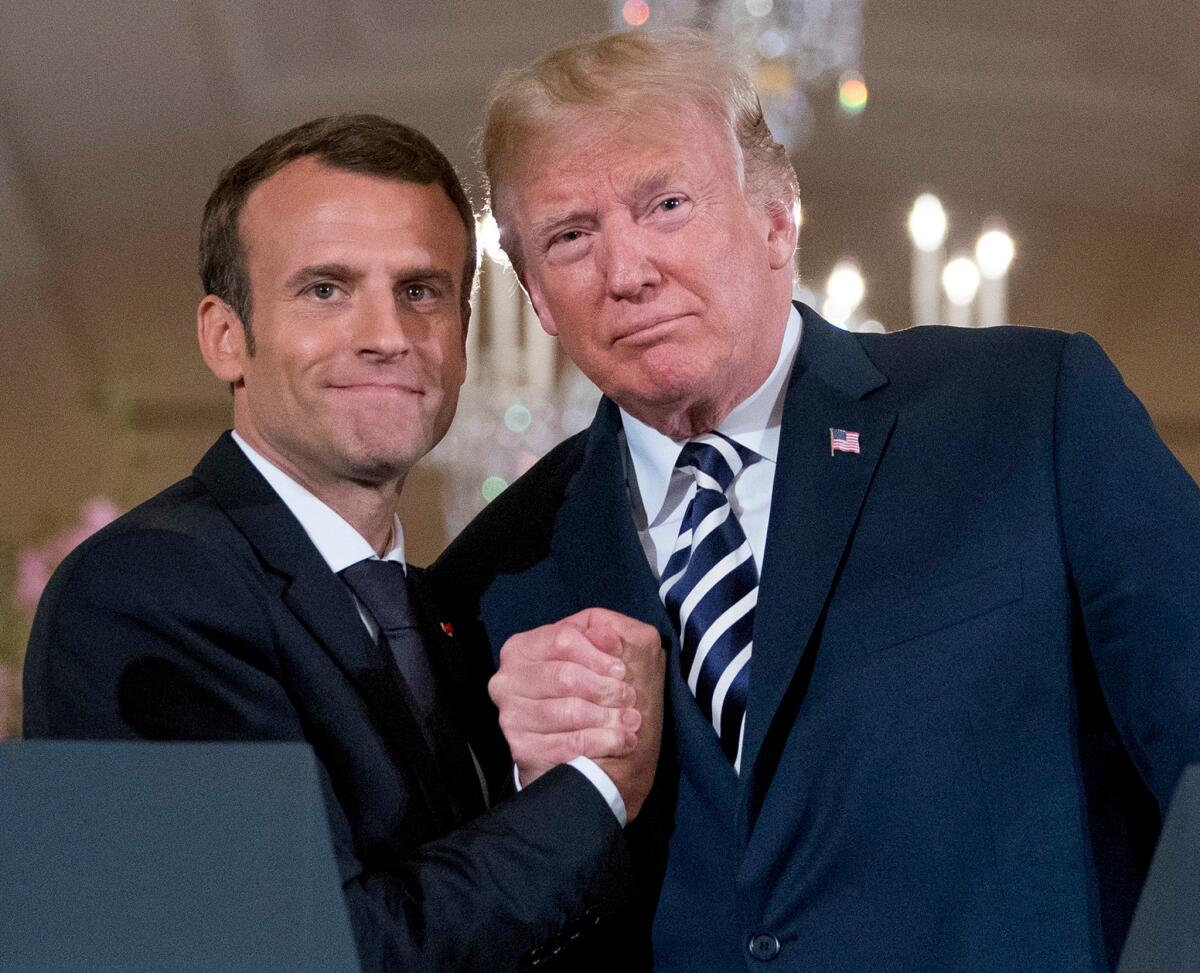Trump threatens France with ‘reciprocal action’ over tax that hits U.S. tech giants

President Trump threatened France with “substantial reciprocal action” over a new digital tax that affects U.S. technology companies.
“If anybody taxes them, it should be their home Country, the USA,” Trump said in a tweet Friday. “We will announce a substantial reciprocal action on Macron’s foolishness shortly.”
French President Emmanuel Macron signed into law a 3% tax on the revenue of technology giants such as Facebook Inc. and Amazon.com Inc.
The tax, which is retroactive to January, affects companies with global revenue exceeding about $840 million and digital sales in France exceeding about $28 million. About 30 businesses would be affected; most of them are American, but the list also includes Chinese, German, British and French firms.
Trump has imposed — or made threats to impose — tariffs on a number of countries in an effort to force changes in their trade or immigration policies. France’s tax, and Trump’s response, threaten to further strain trans-Atlantic ties as the two sides prepare to negotiate a limited trade agreement on industrial goods.
A spokesperson for Macron declined to comment on Trump’s tweet. The French finance ministry did not immediately respond to a request for comment.
Trump’s tweet also referred to his preference for American wine over French wine. Trump last month promised to do “something” about French wine that he said is allowed into the U.S. virtually tariff-free while France imposes duties on U.S. wine, calling the arrangement unfair.
France hasn’t backed off from its planned digital tax even after the U.S. suggested it may use trade tools against the levy.
The U.S. has said it will examine whether the tax would hurt its tech firms, using the so-called 301 investigation, the same tool Trump deployed to impose tariffs on Chinese goods because of the Asian country’s alleged theft of intellectual property.
Trump’s tweet was followed by a White House statement saying the U.S. is “extremely disappointed” by the tax. In addition to the 301 investigation, the Trump administration is “looking closely at all other policy tools,” said spokesman Judd Deere.
“The Trump administration has consistently stated that it will not sit idly by and tolerate discrimination against U.S.-based firms,” Deere said.
France isn’t alone among European nations in arguing that internet companies aren’t paying their fair share into public coffers.
Because they’re often domiciled in other countries — including low-tax jurisdictions such as Ireland or Bermuda — and shift money seamlessly across borders, companies that sell online can easily avoid paying taxes in countries where they nevertheless make significant sales.
France argues that the structure of the global economy has shifted to one based on data, rendering 20th century tax systems archaic. According to 2018 figures from the European Commission, global tech companies pay a 9.5% average tax rate compared with 23.2% for traditional firms.
France became the first country in the European Union to impose such a levy, with other nations, including the U.K. and Germany, considering similar taxes. France had pushed for a European Union-wide digital levy that was scrapped when four countries — Sweden, Finland, Denmark and Ireland — declined to sign off on it.
The tax comes as talks on a limited trans-Atlantic trade agreement on industrial goods have progressed slowly because the U.S. and European Union are at odds over whether to include agriculture in any final agreement. France is the country most adamantly opposed to making any agriculture concessions. Trump’s threat to impose a tariff of as much as 25% on European car exports has cast a cloud over the negotiations as well.
More to Read
Inside the business of entertainment
The Wide Shot brings you news, analysis and insights on everything from streaming wars to production — and what it all means for the future.
You may occasionally receive promotional content from the Los Angeles Times.










